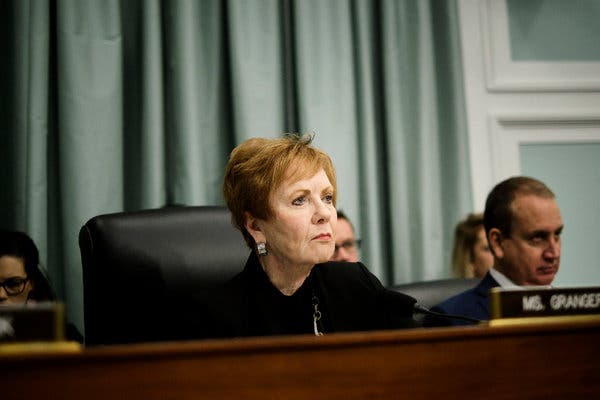Advertisement
Representative Kay Granger is in an expensive primary battle while facing accusations that she has not done enough for President Trump, who endorsed her.

FORT WORTH — On the heated upstairs patio of a downtown bar on a recent Friday night, dozens of Republican voters drank beers, snacked on nachos and cheered and sang along to the chorus of a disparaging ode to a liberal RINO — Republican in name only — from the swamp, who, according to the lyrics, had declared: “I’m Never Trump — you’ll never build that wall.”
The subject of their derision was their longtime congresswoman, Representative Kay Granger, and the man who had brought them there was Chris Putnam, who was running to oust her. In a primary race that reflects the internal struggles of the Republican Party under President Trump, Mr. Putnam is attacking Ms. Granger as not conservative enough for Texas’s 12th Congressional District and insufficiently supportive of the president.
Never mind that Ms. Granger, a 23-year veteran of Congress and the most senior Republican woman in the House, has been endorsed by Mr. Trump himself. Since 1997, when she became the first — and, so far, only — Republican woman to represent Texas in the House, she has climbed the ranks of her male-dominated conference. She is the top Republican on the Appropriations Committee, negotiating funding for a wall at the southwestern border — although less than Mr. Trump has demanded — and steering military projects to her district.
Yet with millions of dollars from outside Texas flooding into Mr. Putnam’s campaign to unseat her, she is now in the most expensive and challenging re-election campaign of her career, forced to defend both her conservative credentials and her place in a party that has shifted substantially since she was first elected. The increasingly nasty contest is testing the degree to which Mr. Trump has reshaped the Republican Party, making unwavering loyalty a prerequisite and rendering suspect any hint of an appetite for compromise.
Given that the deeply conservative bent of her district is likely to determine the outcome of the general election, Ms. Granger’s race is also the latest case in which Republicans appear to be jeopardizing their own desperate push to recruit and elect more women.
“I’ve never been in a race like this one,” Ms. Granger conceded last month at a campaign event on the top floor of a North Richland Hills recreation center, speaking to former education colleagues and students from her days as a teacher and local officials who have come to rely on her support in Congress. “It’s been very, very ugly if you watched some of the ads.”
The threat to Ms. Granger is real. Mr. Putnam, a former technology executive, has pilloried her in particular for two past statements. In 2016, weeks before Election Day, she called for Mr. Trump to end his presidential campaign after audio circulated of him making lewd remarks about women in a segment for “Access Hollywood.” Nine years earlier, she had described herself as “a pro-choice Republican” in a television interview. (She now says she identifies as an anti-abortion conservative.)
But it is her record on the powerful Appropriations Committee that has invited the most national attention, after Club for Growth Action, the political arm of the fiscally conservative group, chose to endorse Mr. Putnam, spurning an incumbent for the first time in years. The group has spent more than $1 million on television ads against Ms. Granger, slamming her support for spending packages that included pay raises for lawmakers, funding for provisions in the Affordable Care Act and other increases.
The decision by some conservative groups to target one of only 11 Republican women seeking to return to Congress has perplexed Ms. Granger and her allies, given the wide acknowledgment among leaders that Republicans have fallen badly behind on recruiting and retaining women to serve, an effort seen as critical to the party’s survival.
“We’re trying to add women to the ranks, not deplete ranks,” said Olivia Perez-Cubas, a spokeswoman for the Winning For Women Action Fund, which is dedicated to electing conservative women and has thrown its support and money behind Ms. Granger. “We’re looking for women who are the best fit for their districts, and that’s her.”
David M. McIntosh, the president of Club for Growth Action, said his group was seeking to defeat Ms. Granger as part of a broader effort to punish lawmakers who have supported excessive federal spending.
“We didn’t target her because she’s a woman — it’s based on her record,” Mr. McIntosh said. “If what we were saying didn’t matter to Texas voters, it wouldn’t make a difference.”
With Ms. Granger’s base predominately in Fort Worth, where she served as the city’s first female mayor, Mr. Putnam has targeted the district’s rural outskirts, hoping to rouse voters who are not as frequently wooed by politicians running for federal office.
“It’s gotten very toxic,” said Carlos Turcios, 18, a high school senior who has become an avid supporter of Ms. Granger’s campaign. “He’s going to alienate a lot of independents, a lot of centrists.”
Mr. Turcios’s father, Juan, said of Mr. Putnam’s record: “What has he done for Fort Worth?”
To counter Mr. Putnam, Ms. Granger secured the coveted endorsement of Mr. Trump and energized her campaign operation, lining up endorsements from anti-abortion rights groups like the Susan B. Anthony List and high-ranking colleagues including Representative Liz Cheney of Wyoming, the No. 3 Republican, to help her raise campaign money.
In interviews with more than two dozen district officials, Texas strategists and voters, Ms. Granger was widely viewed as having the upper hand with her high name recognition and an extensive record of securing projects for her district, which includes a large presence by the military contractor Lockheed Martin, a joint reserve base and other defense priorities. But, they acknowledge, Mr. Putnam has mounted a formidable challenge — and some voters are drawn to a new candidate.
While Ms. Granger is a lifetime Fort Worth resident, Mr. Putnam recently moved from Colleyville, a smaller Dallas and Fort Worth suburb outside the 12th District, where he served three years on the City Council. Mr. Putnam could have run for Congress there; Representative Kenny Marchant, the Republican who has served there since 2005, has announced he is retiring. But that district is far less conservative, and Mr. Putnam, who now lives at a property in Fort Worth and attended college there, said he felt he was a better fit for Ms. Granger’s district.
For now, Mr. Putnam and his allies are working to turn Ms. Granger’s long legislative record against her. While Mr. Putnam is supported by anti-spending activists, one of his principal criticisms of Ms. Granger is that she has not secured enough federal money for the border wall that is Mr. Trump’s signature campaign promise.
Mr. Putnam told voters at an event last month that Mr. Trump had endorsed Ms. Granger only because of “the politics of impeachment.” He noted that the president had tweeted his support for the congresswoman on the eve of the House vote on articles of impeachment to ensure Ms. Granger would stick with him and vote against the charges. (She did, along with every other House Republican.)
At a candidate forum in Azle, a community northwest of Fort Worth, Mr. Putnam scrawled “F-35” on the back of his hand in black pen. It was an apparent reminder to himself to slam Ms. Granger for the loss of funding for two F-35 planes, which are manufactured in the area, as part of Mr. Trump’s efforts to transfer additional money to the border wall.
Ms. Granger called the criticism “absurd,” later telling voters at the forum that she had initially secured funding for 20 more of the jets than the administration had requested.
“Because he’s never served,” she said of Mr. Putnam in an interview, “he doesn’t know what he’s talking about.”
But Mr. Putnam is working to make his relative inexperience a virtue, and to portray Ms. Granger as entrenched and corrupt. As Exhibit A, he has pointed to Panther Island, the colloquial name for the Central City Flood Control Project, a troubled economic development project that would reroute the Trinity River to minimize flooding.
The project, which has struggled to secure federal money despite Ms. Granger’s powerful perch on the House panel that allocates funding, has been under the management of her son, J.D. Granger, who serves as executive director. The arrangement has prompted accusations of nepotism and self-dealing even after Mr. Granger’s role changed in the fall to oversee more specific aspects of the flood control project. (He remains involved in it.) Both he and his mother insist there is no conflict of interest.
“If we’re talking about her phone not working or her TV, then I call her ‘Mom,’ ” Mr. Granger said. “But whenever it’s a federal issue, she’s ‘Congresswoman.’ ”
In the meantime, residents continue to drive around the construction of three bridges over dry land — “a monstrosity of a bridge,” Mette Blockhan, a Fort Worth occupational therapist, said of one of them — a constant reminder of unfinished work and apparent dysfunction.
Some voters here say Ms. Granger has come to take them for granted.
“She’s used to us pulling the lever,” said Sara Heizer, 72, a retired resident of neighboring Parker County, who drove to Fort Worth for Mr. Putnam’s rally. “An undervote was the only way we could protest her.”
Kitty Bennett contributed research.


